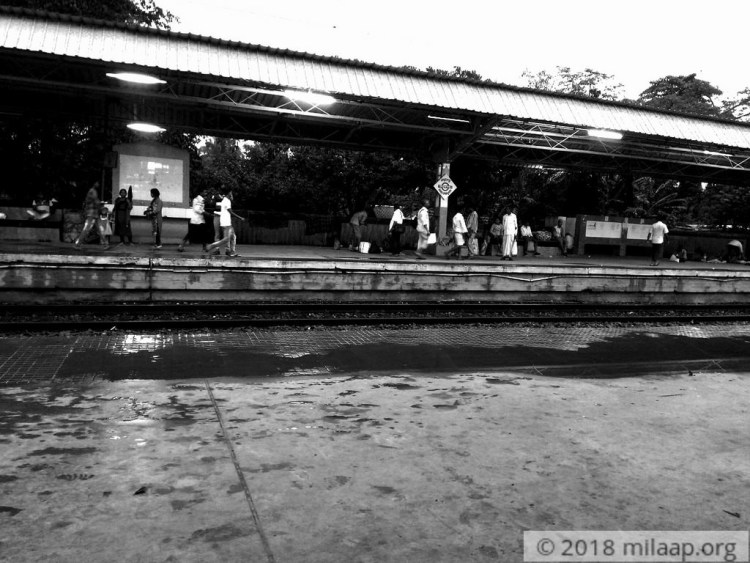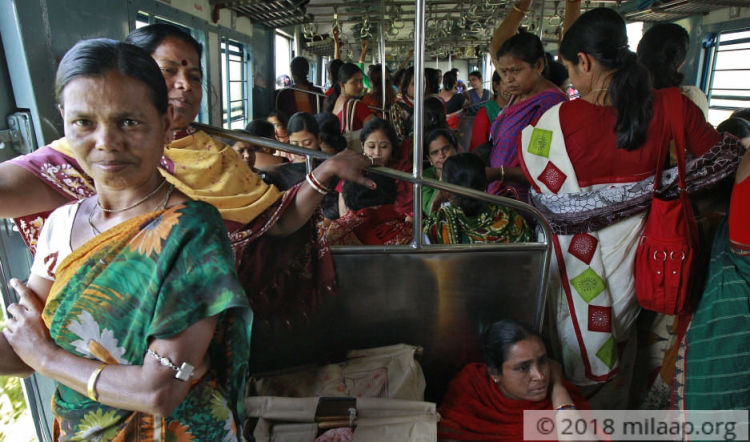The drizzling had just begun. I was standing in the queue to purchase my train ticket when a boy approached me. “O, Didi! Du taka dao na. Ticket kinbo.” (Sister, give me two rupees. I need to purchase my ticket). I ignored him. He went away without saying anything else. I turned around to look at him. He moved from one passenger to another asking for money.

The cacophony in the crowded station drowned out the station master’s announcement. I tried to listen to the announcement intently. Right after the announcement, I saw few men with rubber slippers on running towards the platform. Bengalis are often stereotyped as “lazy.” I beg to differ. If you get the opportunity to check out highly energized Bengalis trying to compete for seats, you’ll change your perception as well.

I spend at least six hours on local trains once a week. I have been doing this for the past three months. In these three months, I have witnessed the myriad of travelers and their interactions. Once the train reaches the platform, the passengers claw the doors; yell at each other while trying to grab the handrail. I never had or will have the audacity to compete with them. Women often elbow each other to board the train first.
I boarded the train at 8 in the morning. I found a window seat, settled down, and took off my shoes. I kept my feet on the opposite seat. As I sat there listening to music, I saw a passenger trying to reserve a seat by placing a handkerchief on the vacant seat.

As the train left the platform, the hawkers started selling a variety of food ranging from boiled eggs, sweets, grams and other treats. They also sell women accessories, ‘gamchas’(bath towels) and other products. I am a music aficionado. Maybe that is the reason; I consider their cry or scream to be melodious. There is a considerable amount of intensity in their voice when they request the passengers to purchase their products.
“Chaa khabe, coffee khabe”, a hawker selling tea and coffee brought me out of my reverie. He sat in one of the empty seats and looked at the barely moving fan overhead. He wiped his sweat with the ‘gamcha’, exhaled and got up to continue with his work.

When I boarded the ladies compartment, only a few women were present on the train. After half an hour, the scenario changed completely. On a bench, three people are supposed to be seated. However, during the rush hour, five people adjust and sit. “Arektu chaapen na” (Shift some more. Make some space), this is one of the common dialogues you will get to hear during the rush hour.
As the platform approached, I stood with the hawkers and other passengers ready to disembark the train. As the train stopped, everyone got down. Everyone had a disturbing urgency on their faces like always. I walked towards the exit gate and saw the field officer waiting for me on his bike. I hopped on, ready to embark on another journey to reality.


The cacophony in the crowded station drowned out the station master’s announcement. I tried to listen to the announcement intently. Right after the announcement, I saw few men with rubber slippers on running towards the platform. Bengalis are often stereotyped as “lazy.” I beg to differ. If you get the opportunity to check out highly energized Bengalis trying to compete for seats, you’ll change your perception as well.

I spend at least six hours on local trains once a week. I have been doing this for the past three months. In these three months, I have witnessed the myriad of travelers and their interactions. Once the train reaches the platform, the passengers claw the doors; yell at each other while trying to grab the handrail. I never had or will have the audacity to compete with them. Women often elbow each other to board the train first.
I boarded the train at 8 in the morning. I found a window seat, settled down, and took off my shoes. I kept my feet on the opposite seat. As I sat there listening to music, I saw a passenger trying to reserve a seat by placing a handkerchief on the vacant seat.

As the train left the platform, the hawkers started selling a variety of food ranging from boiled eggs, sweets, grams and other treats. They also sell women accessories, ‘gamchas’(bath towels) and other products. I am a music aficionado. Maybe that is the reason; I consider their cry or scream to be melodious. There is a considerable amount of intensity in their voice when they request the passengers to purchase their products.
“Chaa khabe, coffee khabe”, a hawker selling tea and coffee brought me out of my reverie. He sat in one of the empty seats and looked at the barely moving fan overhead. He wiped his sweat with the ‘gamcha’, exhaled and got up to continue with his work.

When I boarded the ladies compartment, only a few women were present on the train. After half an hour, the scenario changed completely. On a bench, three people are supposed to be seated. However, during the rush hour, five people adjust and sit. “Arektu chaapen na” (Shift some more. Make some space), this is one of the common dialogues you will get to hear during the rush hour.
As the platform approached, I stood with the hawkers and other passengers ready to disembark the train. As the train stopped, everyone got down. Everyone had a disturbing urgency on their faces like always. I walked towards the exit gate and saw the field officer waiting for me on his bike. I hopped on, ready to embark on another journey to reality.









